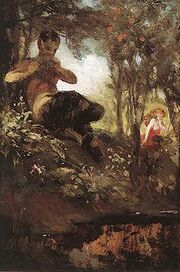
The Faun (also Phaunos or Faunus) is a rustic forest god or place-spirit (genii) of Roman mythology often associated with Greek satyrs and the Greek god Pan.
Origins[]
The faun is a half human - half goat (from the head to the waist being the human half, but with the addition of goat's horns) manifestation of forest and animal spirits which would help or hinder humans at whim. Romans believed fauns inspired fear in men traveling in lonely, remote or wild places. They were also capable of guiding humans in need, as in the fable of The Satyr and the Traveller, in the title of which Latin authors substituted the word Faunus. Fauns and satyrs were originally quite different creatures: whereas fauns are half-man and half-goat, satyrs originally were depicted as stocky, hairy, ugly dwarfs or woodwoses with the ears and tails of horses or asses.
Ancient Roman mythological belief also included a god named Faunus and a goddess named Fauna who were goat people.
Fauns in art[]
The Barberini Faun (located in the Glyptothek in Munich, Germany) is a Hellenistic marble statue from about 200 BCE that was found in the Mausoleum of the Emperor Hadrian (the Castel Sant'Angelo) and installed at Palazzo Barberini by Cardinal Maffeo Barberini (later Pope Urban VIII). Gian Lorenzo Bernini restored and refinished the statue.
The House of the Faun in Pompei, dating from the 2nd century BCE, was so named because of the dancing faun statue which was the centerpiece of the large garden. The original now resides in the National Museum in Naples and a copy stands in its place. Ivory Faun by Baron Triqueti, circa 1860The French symbolist Stéphane Mallarmé's famous masterpiece L'après-midi d'un faune (published in 1876) describes the sensual experiences of a faun who has just woken up from his afternoon sleep and discusses his encounters with several nymphs during the morning in a dreamlike monologue. The composer Claude Debussy based on it his symphonic poem Prélude à l'après-midi d'un faune (1894).